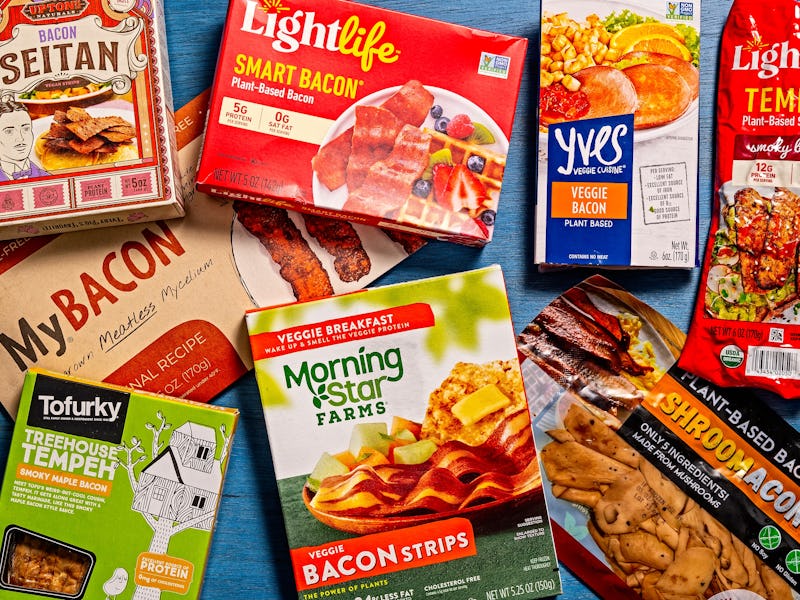Swapping Meat for These Plant-Based Alternatives May Actually Have Real Heart Health Benefits
Lower cholesterol, less saturated fat, more fiber — pass the veggie burgers.

If you follow diet trends or feel yourself getting paleo-influenced, it’s easy to assume that your vegan burger alternative and ‘chick’n’ strips are junk food. But not all ultra-processed foods are created equal and compared to real meat, the fake stuff is likely heart healthier, according to a new study published June 26 in the Canadian Journal of Cardiology.
The researchers conducted a large review, re-evaluating and synthesizing the results of dozens of nutrition and health studies released between 1970 and 2023. They found that plant-based meat alternatives (PBMAs) generally have better nutrition profiles than meat–despite being highly processed — and that swapping meat for PBMAs can significantly minimize some markers of risk for cardiovascular disease.
Store-bought fake meats “generally align with recommendations for improving cardiovascular health… replacing meat with PBMAs may be cardioprotective,” the authors write. Though fake meats vary a lot in their ingredients and nutritional content, the review found consistent evidence across previously published studies that PBMAs are generally lower in saturated fat and cholesterol than commonly eaten cuts of animal meat. Some evidence also suggests fake meats tend to be lower calorie. At the same time, the meat replicates were generally higher in fiber and “good” polyunsaturated fats.
To truly evaluate the health effects of specific diets, you have to look at the real-world impact that certain foods have on people. So, the review further assessed clinical trials to suss out what happens to those who opt for plant-based meat alternatives. Across six randomized controlled trials, the reviewers found consistent evidence that people eating PBMAs and other plant-based protein sources over meat (including lean and “white” meats) had lower total cholesterol, and lower LDL (i.e. “bad”) cholesterol. Some of the studies also indicated that people lost weight and had reduced waist circumference after avoiding meat in favor of PBMAs and other plant proteins for a period of time. “We did not find any potentially negative effects in studies that replaced meat with PBMAs,” note the authors.
In a handful of assessments of common PBMA protein sources, the scientists saw some additionally promising results. A 2022 review found that soy consumption is associated with a 17 percent reduction in heart disease risk and an 18 percent reduction in stroke risk, while also reducing cancer risk. Eating pea protein, another common ingredient in veggie burgers and vegan nuggets, in lieu of meat has also been found to reduce heart disease risk — though to a lesser degree than soy consumption, according to the new review. Mycoprotein, derived from fungi, may carry metabolic and muscle-building benefits over meat, according to some prior research.
“For those looking to reduce their meat intake, especially if it’s red meat, replacing that with PBMAs is likely a heart-healthy choice. For those who already limit their meat intake, PBMAs can be incorporated into a healthy dietary pattern as an excellent protein source,” said Ehud Ur, lead study author and a professor of endocrinology and metabolism at the University of British Columbia, Vancouver, in a press release.
However, there are some caveats and lingering unknowns. PBMAs vary widely, and some may be heart-healthier than others. For instance, fake meats made with canola or olive oil over coconut and palm oils are probably the healthiest choice. Plus, across the board, many meat-alternatives contain high levels of sodium. Diets high in sodium can raise blood pressure and the risk of heart disease, though in a caveat to the caveat, it’s difficult to accurately compare PBMA salt levels with those in meat and many studies that attempt to do so often don’t account for seasoning added to beef or chicken in the cooking process.
The review study further emphasizes that more research studies — especially long-term randomized controlled trials — are needed “to draw more definitive conclusions.” Some plant-based protein sources are exceptionally understudied. The reviewers weren’t able to find a single clinical trial evaluating the health effects of replacing animal protein with foods containing vital wheat gluten (a common PBMA ingredient, and the chief component of seitan).
Despite the gaps, it’s an “excellent review,” writes J. David Spence, a clinical pharmacology professor researching stroke risk and heart disease at Western University in Ontario, in an editorial article accompanying the study. Spence wasn’t involved in the research directly, but he, too, recommends plant-based meat substitutes as a means to reduce cardiovascular risk. So take heart, your vegan faves may be healthier than you’d expect from something formed into a patty shape at a pea-protein processing facility. But it's probably important to eat some real vegetables too.